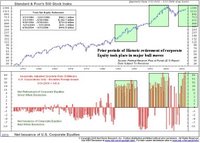Supply vs. Demand
The law of supply and demand is one of the basic underpinnings of economics. It applies to practically all aspects of economic activity - including the stock market.

We recently reviewed this chart from Ned Davis Research which shows that the supply of stock has been shrinking at an accelerating rate for the past several quarters. Share buyback's and merger & acquisition activity are more than offsetting new equity issuance from IPO's and the like.
When you have stable demand for a good (milk, gasoline, or in this case, stocks) and supply is reduced, the price is adjusted upward until a new equilibrium between supply and demand is reached. So one could conclude that the reduced supply of stocks should have a positive impact on share prices (again assuming stable demand). And a reduced supply of stock with coupled with rising demand could put significant upward pressure on stock prices.
Of course, demand for stocks is not stable. It is affected by a myriad of variables in addition to the supply of shares, including economic activity and corporate profits to the search for Bin Laden. Indeed, demand for stocks has been ebbing of late given all the concerns we have discussed in previous posts, leaving stock prices stable at best. So, a shrinking supply of stock by itself is certainly not a guarantee of future gains.
What intrigues us is the notion that when demand for stocks does return, the reduced supply should provide additional help moving share prices higher.

We recently reviewed this chart from Ned Davis Research which shows that the supply of stock has been shrinking at an accelerating rate for the past several quarters. Share buyback's and merger & acquisition activity are more than offsetting new equity issuance from IPO's and the like.
When you have stable demand for a good (milk, gasoline, or in this case, stocks) and supply is reduced, the price is adjusted upward until a new equilibrium between supply and demand is reached. So one could conclude that the reduced supply of stocks should have a positive impact on share prices (again assuming stable demand). And a reduced supply of stock with coupled with rising demand could put significant upward pressure on stock prices.
Of course, demand for stocks is not stable. It is affected by a myriad of variables in addition to the supply of shares, including economic activity and corporate profits to the search for Bin Laden. Indeed, demand for stocks has been ebbing of late given all the concerns we have discussed in previous posts, leaving stock prices stable at best. So, a shrinking supply of stock by itself is certainly not a guarantee of future gains.
What intrigues us is the notion that when demand for stocks does return, the reduced supply should provide additional help moving share prices higher.



0 Comments:
Post a Comment
<< Home